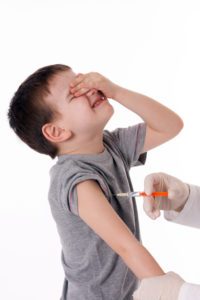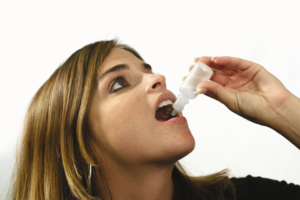Potential Treatment for Seasonal Allergies
 Did you know that one in five people in America suffer from allergies, asthma or both?
Did you know that one in five people in America suffer from allergies, asthma or both?
That’s over 36 million allergy patients and at least fifteen million more asthmatics. And that number is on the rise with the prevalence of asthma in children nearly doubling since the 1980s.
Knowing what treatment methods actually work and which ones are either outdated or inefficient can make all the difference between seizing the day and sneezing all day.
INEFFICIENT METHODS
 AVOIDANCE – This method seeks to put as much distance between yourself and the allergens affecting you.
AVOIDANCE – This method seeks to put as much distance between yourself and the allergens affecting you.
While it makes sense and is recommended to avoid anything that triggers your allergies, no one can predict everything they will come into contact with throughout the day.
This method can also prove difficult as it can potentially separate the afflicted from friends and family members who are otherwise unaffected by seasonal allergy conditions.
PREVENTION – The other side of avoidance’s coin, prevention works to actively identify locations, events, times, and allergen carriers to take proactive steps in eliminating their potential to incite an allergic reaction.
Together, both avoidance and prevention can be used to lower your rate of exposure but neither method alleviates any actual symptoms, let alone cures any allergies. These methods are not enough on their own and require stronger supplemental treatment methods to be used with them.
OUTDATED METHODS
 OVER THE COUNTER MEDICINES – Because antihistamines treat the allergy’s symptoms but not the cause of the allergies, users are forced to continue taking the medication throughout allergy season. Many antihistamines can cause drowsiness, making it impractical for those with a busy day ahead.
OVER THE COUNTER MEDICINES – Because antihistamines treat the allergy’s symptoms but not the cause of the allergies, users are forced to continue taking the medication throughout allergy season. Many antihistamines can cause drowsiness, making it impractical for those with a busy day ahead.
NASAL SPRAYS – Like oral-ingested antihistamines, nasal sprays do not treat the cause of the allergies, merely the superficial symptoms. They also take several days to provide relief, with side effects such as burning, dryness, and nosebleeds.
 ALLERGY SHOTS – For allergy shots to work you must maintain a strict schedule of injections that lasts for years and requires frequent doctor’s visits. No wonder the compliance rate among patients receiving allergy shots is only around 35 percent.
ALLERGY SHOTS – For allergy shots to work you must maintain a strict schedule of injections that lasts for years and requires frequent doctor’s visits. No wonder the compliance rate among patients receiving allergy shots is only around 35 percent.
Because you are injected with a form of the allergen, side effects resemble the same uncomfortable allergic reactions you were seeking relief from in the first place, potentially including shortness of breath, tightening of the throat, and itchy eyes. It is also required that all patients remain under a physician’s care for approximately thirty minutes immediately following an injection due to the chance you can slip into anaphylactic shock… Yikes!
THE BEST ALLERGY TREATMENT
ALLERGY DROPS – Also known as sublingual immunotherapy, or SLIT, allergy drops are similar to allergy shots in that they use a small portion of the allergen in its treatment. True to their name, allergy drops treatment is as simple as administering a drop under the tongue to treat allergies.
BENEFITS: What sets allergy drops apart from OTC medications, nasal sprays, and even allergy shots is that allergy drops go beyond treating the symptoms caused by allergies and actually cure the patient of their allergies over time. Asthma can also be treated with allergy drops much more effectively than any other method.
 WHY THEY WORK: Because allergy drops use a more balanced and ultimately safer dosage than injection treatments, patients are able to administer the drops in the comfort of their own home after picking up their prescription. The ease and convenience of allergy drop treatment makes its 75 percent compliance factor among patients a no-brainer.
WHY THEY WORK: Because allergy drops use a more balanced and ultimately safer dosage than injection treatments, patients are able to administer the drops in the comfort of their own home after picking up their prescription. The ease and convenience of allergy drop treatment makes its 75 percent compliance factor among patients a no-brainer.
SAFETY: Allergy drops can be safely administered to children as young as four years old. And because the dosage is balanced much better than injection treatment, the potential for any reactions is drastically reduced.
The sheer number of options available to you this allergy season makes it all the more important to be informed. Because each person’s body and the way their allergies affect them will be different, be sure to consider all of your options and be wary of complications and side effects. Remember to ask yourself if you are looking to treat only the symptoms or if you are looking to cure your allergies through the use of allergy drops.
If you have any questions or concerns regarding your seasonal allergies and potential treatment methods do not hesitate to schedule an appointment with Dr. G to talk more. We’d love to hear from you!
